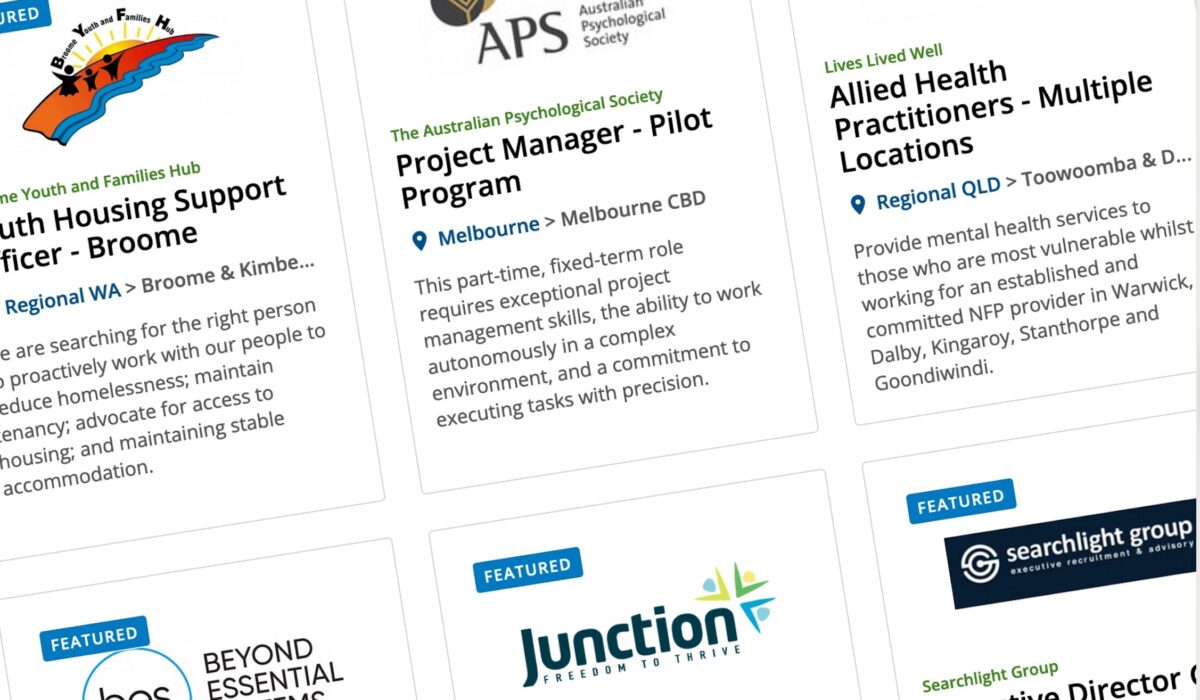There it is, gleaming at the top of your LinkedIn feed: your dream job, a high-level, well-paying position in your field. Are you qualified enough? Should you apply? New research shows that women might be less likely to take that chance than men. Businesses can take a simple step to draw more women to apply: Make it easier for candidates to know whether they are qualified. Instead of using vague language about the experience or skills candidates need in job postings, be more precise about expected qualifications. When businesses ask for specific levels of experience and skills, more women that meet those requirements are likely to apply.
Recruitment
Six trends that will shape work in the NFP sector in 2024 – apart from AI!
If 2024 isn’t the year that “AI will change everything”, what will this year hold when it comes to people, culture and work in Australia’s NFP sector?
Here’s a look at the top 5 trends the EthicalJobs.com.au team sees shaping recruitment, HR and P&C leaders and teams at Australian not-for-profit organisations over 2024:
This ‘tick’ can help make your organisation more attractive to candidates
While the ‘war for talent’ is a terrible metaphor, in a time of record-low unemployment almost every NFP organisation is looking hard for ways to make themselves more attractive to the best candidates.
And with more than 10 percent of Australians identifying as LGBTIQ, a June 2023 survey of 5,474 people who identify as LGBTIQ across Australia and 12 other countries found that one-third were looking to move to a more LGBTIQ-inclusive employer.
One tool that can help you to attract more LGBTIQ candidates and volunteers to your organisation – and better retain your existing LGBTIQ employees and volunteers too – is the ‘Rainbow Tick’.
How to onboard a new leader for your organisation
Most NFP board members know that their most important responsibility is to make sure their not-for-profit’s leader has the support and tools they need to make the organisation thrive. Despite this, almost half of all surveyed NFP CEOs saying that they didn’t get a proper onboarding when they started their jobs.
But given that NFP boards are made up of volunteers it’s understandable that many organisations struggle in this area. So here are five recommendations to give a new leader the best start at possible at your NFP.
Different types of job titles & how to use them effectively
You probably know that making a small change to a job title when you advertise a job can make a huge difference to the type and volume of applicants that you get.
But that’s just one of many reasons why making sure that every role in your organisation has the right job title is a key part of attracting the right people and aligning them with your organisation’s mission and goals.
This post looks at four things you should always consider whenever you’re deciding on a job title.
We asked the NFP sector about how they use employee referral programs. Here’s what they said
One recruitment tool that many NFPs have yet to embrace is an employee referral program. So we surveyed and compiled benchmark data from Australian NFP organisations of all sizes, showing how they’re currently using employee referral programs.
This post has the full low-down, including some tips on how to get started if you’re part of the 63% of NFP organisations without one.
9 things to do differently if you’re struggling to find the right candidate (or any candidates) for your job
It’s a difficult time to recruit staff for just about every not-for-profit organisation. The Australian job-market as a whole is tighter than ever, with record-low unemployment. That means fewer people than ever are looking for a job – and job vacancies are up 95 per cent in the last three years.
So if you’ve tried to fill a role and haven’t found the right candidate – or perhaps haven’t found any candidates at all – here are the top nine things you should consider changing.
Should you re-hire an employee who left your organisation? Here’s what the evidence says
So you lost a superstar employee to greener pastures – perhaps enticed by a promotion, a salary increase or an opportunity to take a new direction or explore a long-held passion.
But now they’re keen to come back and you’ve just come across their updated resume in your applicant management system. What should you do?
How to improve your job interviews with candidates who have autism
Employers are gradually getting better at recognising the value of including neurodiverse people in their organisations, and information about accommodation strategies is starting to become more readily available.
That said, these accommodations aren’t helpful to workers if they are unable to land a job in the first place. Recruitment and selection practices can inadvertently negatively impact candidates with autism.
Some simple tactics can help lessen the likelihood of this happening.
Six interview questions to recruit staff with a growth mindset
Alongside skills, experience and ‘fit’ with your organisation’s culture, do you consider ‘mindset’ when you recruit new staff and volunteers?
When you hire people with a growth mindset, you are setting your organisation up to succeed further into the future.
Here are six growth mindset-focused interview questions that you can try in your next interview.











